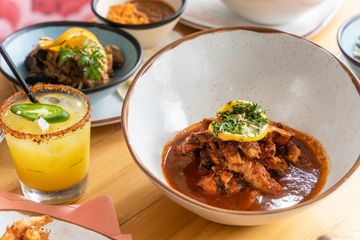Is Mexican Food Healthy And Balanced? Unloading the Nutritional Advantages of Traditional Components
The inquiry of whether Mexican food is healthy and balanced invites an exploration of its standard active ingredients. Beans and corn work as foundational staples, rich in protein and fiber. Avocados supply valuable fats, while various natural herbs and seasonings include taste and health benefits - hand crafted margarita. Together, these elements develop a tapestry of nourishment. The healthiness of Mexican food often depends on prep work approaches and section dimensions. What duty do these variables play in establishing its total dietary worth?
The Power of Beans: Healthy Protein and Fiber-Rich Staples
Although often overlooked, beans function as a keystone of Mexican food, offering a wealth of dietary advantages. Rich in protein, they are an outstanding plant-based alternative for those looking for to fulfill their nutritional protein needs. This high protein material supports muscular tissue fixing and development, making beans indispensable for both meat-eaters and vegetarians alike. Furthermore, beans are a remarkable source of dietary fiber, which assists in food digestion and advertises a sensation of volume, potentially assisting with weight monitoring.
The selection of beans utilized in Mexican dishes, such as black beans, pinto beans, and kidney beans, adds to a diverse flavor account and can enhance dishes nutritionally. Beans are low in fat and consist of important vitamins and minerals, consisting of magnesium, folate, and iron. Together, these qualities make beans a critical component, supplying both nutrition and nutrition in conventional Mexican price.

Corn: a Versatile Grain With Nutritional Conveniences
Corn stands out as a versatile grain essential to Mexican cuisine, celebrated not only for its cooking applications however additionally for its outstanding nutritional account. As a key active ingredient in recipes like tortillas, tamales, and pozole, corn provides important nutrients that contribute to a balanced diet plan. Rich in carbohydrates, it serves as a considerable energy source, while also being low in fat, making it a positive alternative for different nutritional requirements.
Additionally, corn is a great source of dietary fiber, which aids in digestion and promotes satiation. It includes significant amounts of vitamins such as B-complex vitamins, which are vital for basal metabolism. The visibility of anti-oxidants, particularly carotenoids, adds to overall health by lowering oxidative anxiety. Furthermore, corn is gluten-free, accommodating those with gluten level of sensitivities. On the whole, the dietary benefits of corn emphasize its value in conventional Mexican food and its role in a healthy and balanced diet plan.
Avocados: Healthy Fats and Nutrients in Every Bite
Avocados play a substantial role in Mexican food, matching dishes with their luscious structure and rich taste. Beyond their cooking appeal, avocados are commemorated for their remarkable nutritional account. They are a rich resource of healthy monounsaturated fats, which can help lower negative cholesterol levels and assistance heart health and wellness. Additionally, avocados are loaded with necessary minerals and vitamins, consisting of potassium, vitamin E, and B vitamins, adding to general wellness.
The high fiber web content in avocados aids food digestion and promotes satiety, making them a beneficial enhancement to any dish. Their distinct nutrient make-up can also sustain skin health and supply anti-inflammatory advantages. Integrating avocados right into traditional Mexican meals or enjoying them as a standalone snack can boost both flavor and nutrition, showing why they are a beloved staple in Mexican cuisine. On the whole, avocados supply a delicious method to enjoy healthy fats and vital nutrients in every bite.

Flavors and Natural Herbs: Flavorful Wellness Boosters
While enjoying the rich flavors of Mexican cuisine, one can not overlook the vital duty that spices and natural herbs play in improving both preference and health and wellness. Active ingredients such as cilantro, chili, and oregano peppers not only add to the vivid taste account yet likewise supply considerable health benefits. Cilantro is recognized for its purifying residential properties, helping to get rid of hefty steels from the body, while oregano is loaded with antioxidants and possesses anti-inflammatory effects.
Chili peppers, a staple in many Mexican recipes, have capsaicin, which has actually been linked to boosted metabolic process and pain alleviation. Furthermore, spices like cumin and coriander assistance digestion and may help in blood glucose guideline. Integrating these delicious health boosters right into meals not only improves the culinary experience however also advertises total well-being, making Mexican food not just scrumptious, however additionally nutritionally helpful.
Conventional Food Preparation Methods: Enhancing Nourishment and Flavor
Standard cooking techniques in Mexican food play a necessary role in improving both nutrition and flavor, as they often focus on fresh ingredients and classic strategies. Techniques such as nixtamalization, where corn is soaked and prepared in an alkaline solution, not only boost the nutrient profile of tortillas however additionally enhance their digestibility - tacos. Additionally, making use of sluggish food preparation approaches, like cooking or braising, permits flavors to combine magnificently while retaining the integrity of the components

Frequently Asked Inquiries
Are Mexican Food Portions Usually Larger Than Other Cuisines?
Mexican food sections are often bigger than those of several various other foods. This particular shows traditional dining methods, emphasizing common sharing and hearty meals, which can cause a much more substantial serving dimension in general.
Exactly how Does the Preparation Approach Affect Healthiness of Mexican Food?
Preparation methods greatly affect the healthfulness of Mexican food. Techniques such as barbecuing or steaming maintain nutrients, while frying can increase unhealthy fat web content. Options of components and cooking designs ultimately figure out overall nutritional value.
Can Mexican Food Be Customized for Certain Nutritional Restrictions?
Mexican food can undoubtedly be customized for specific dietary limitations. Replacements, such as making use of corn tortillas for gluten-free diets or incorporating more vegetables, make it possible for people to delight in conventional tastes while fitting different nutritional requirements.
What Are Typical False Impressions Concerning Mexican Food and Wellness?
Common misconceptions concerning Mexican food consist of the idea that it is naturally undesirable, overly spicy, and solely concentrated on fats. In truth, typical recipes usually include healthy components and can be tailored to various dietary demands.
Exist Much Healthier Choices at Mexican Dining Establishments?
Much healthier choices at Mexican restaurants frequently include grilled meats, beans, and fresh veggies. Selecting meals that emphasize entire ingredients and avoiding hefty sauces can lead to an extra nourishing dining experience, promoting total wellness.
The selection of beans made use of in Mexican dishes, such as black beans, pinto beans, and kidney beans, contributes to a varied flavor account and can improve meals nutritionally. Avocados play a significant duty in Mexican cuisine, complementing meals with their creamy texture and abundant flavor. Including avocados into traditional Mexican recipes or enjoying them as a standalone treat can improve both taste and nutrition, showing why they are a cherished staple in Mexican cuisine. While taking pleasure in the rich tastes of Mexican cuisine, one can not forget the necessary role that spices and natural take out and delivery herbs play in boosting both preference and health. Traditional food preparation approaches in Mexican cuisine play an essential function in enhancing both nutrition and taste, as they typically prioritize fresh components and classic methods.